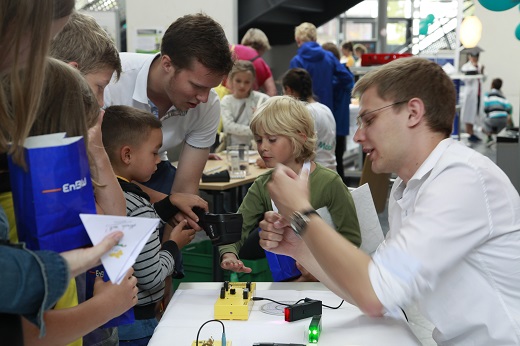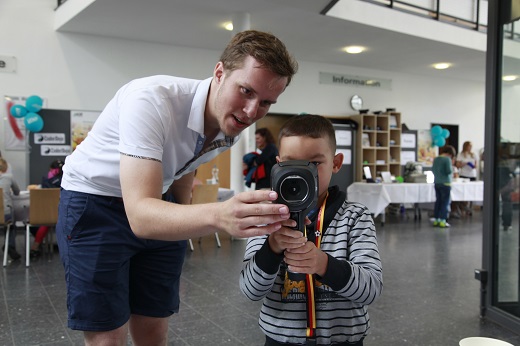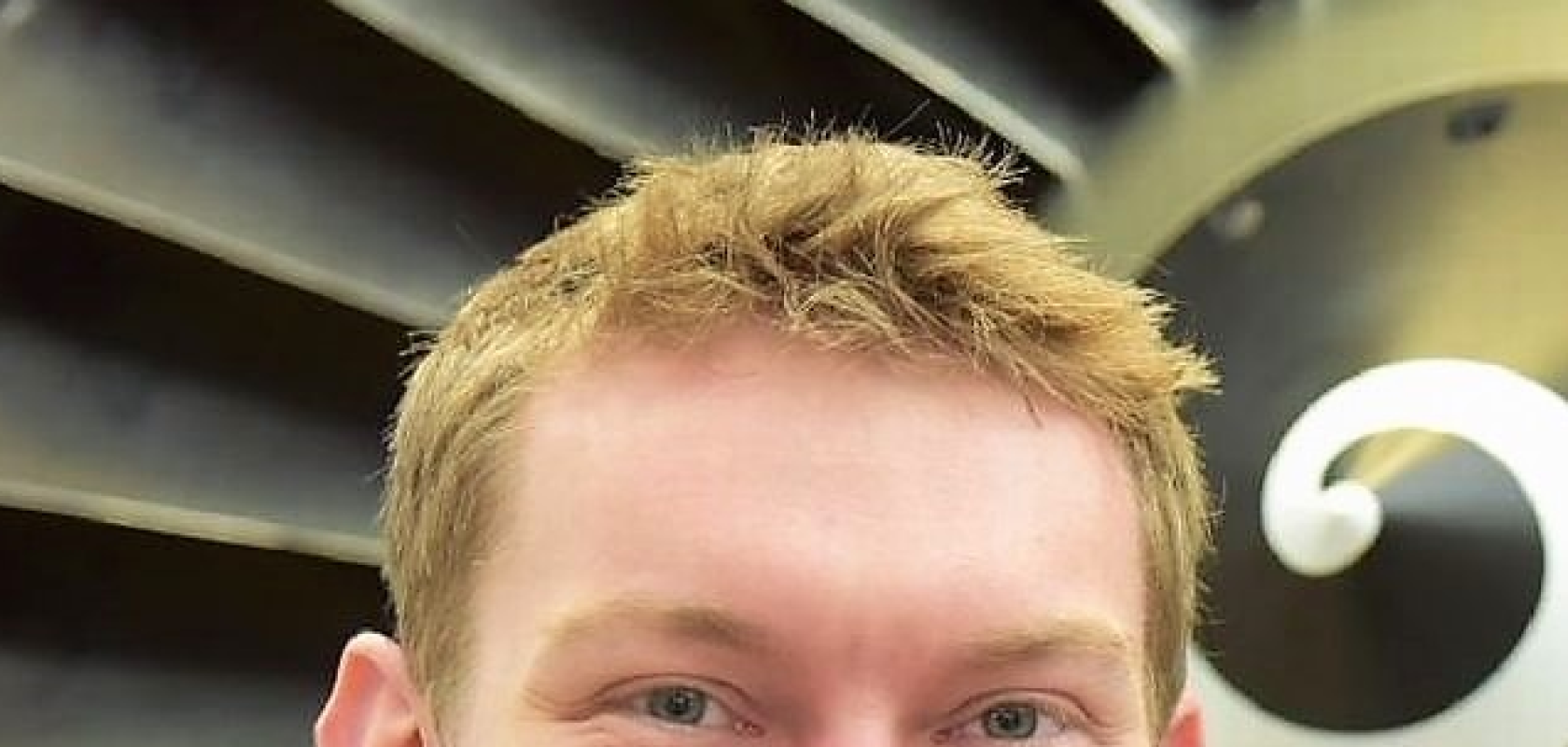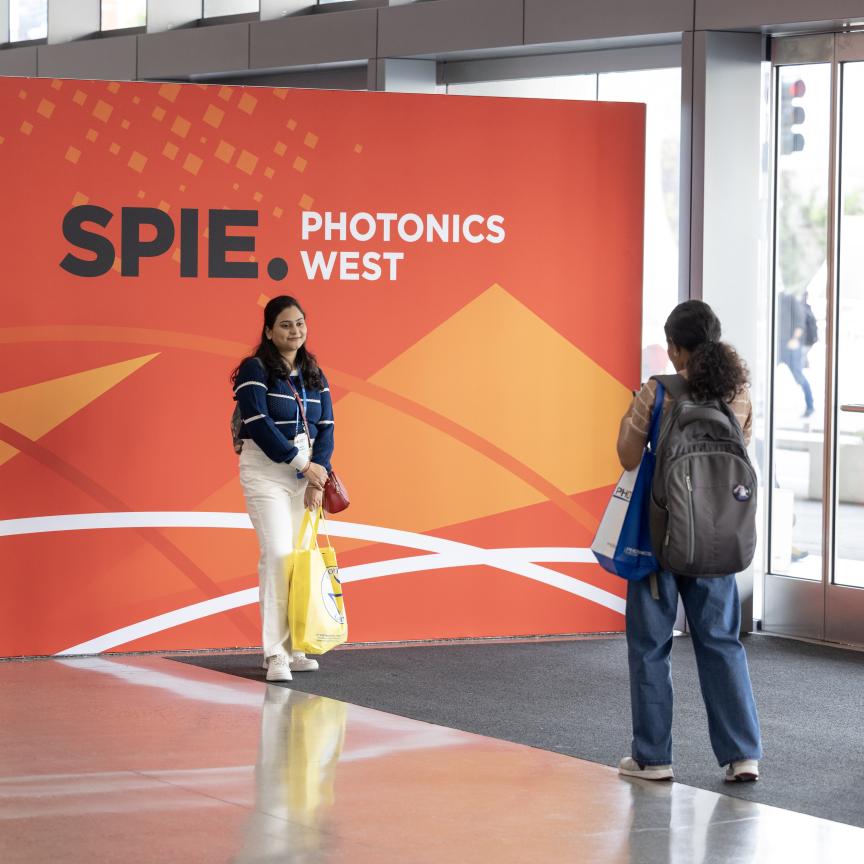Optics Students Karlsruhe is a student organisation promoting optics within university and the general public. Its president, Orlando Torres Perales, talks about how the association is not just encouraging young people into the optics field, but is providing the students running it with essential skills for their future careers in the optics industry
I always believed that it would be really interesting to go into schools and promote science to young people, but when I first tried to find out whether such an idea was possible, I was told: 'Well, no, not really; it is a little bit more complicated than that. We would need permission from the school to come and talk, set an appointment, and it would need to be a specific course; we can’t just go there'. I sighed, but kept the thought in my mind. Is it really that difficult to promote science to young people?

OSKar hosts events where young children can interact with optics experiments. (Credit: OSKar)
Optics Students Karlsruhe (OSKar), a student association officially instated in 2010, has been working towards a simple goal – to advance and spread knowledge of optics and photonics.
There are some common conceptions about the optics field. ‘Oh, you study optics, so you make eyeglasses?' is one example and, while technically correct, doesn’t take into account that the field of optics is far larger – long-haul communications, disease detection, environmental monitoring, and even borderline sci-fi laser propulsion are all in the realm of optics and photonics. The problem is proving that optics is so omnipresent – yet, not in the foreground – in our everyday lives.
In the last two years, the focus of OSKar as a student group has been reaching out farther into other student groups and organisations in Karlsruhe to promote optics in science. Being almost entirely a STEM institution, the Karlsruhe Institute of Technology (KIT) promotes science every year with events on campus such as the open door day (TdoT, for its German abbreviation), where student groups and research institutes show why their work is important; and Kinder Uni, where young children are invited to listen to fun conferences and interact with student experiments.

OSKar will be involved in both events this year, giving some demonstrations that use light and optics, such as an infrared camera, polarisation glasses and basic optics phenomena, like reflection, refraction and light focusing. OSKar is also participating in Girl’s Day, an initiative in Germany that promotes science among young women, by providing role models and mentors who are involved in STEM fields, and putting on activities that demonstrate that science can also be an entertaining activity. OSKar has planned to bring as many of our female members (which make up 25 per cent of the roster of the group) to participate in this event to encourage young girls in the exciting world of optics.
In the vacuum, all of these activities sound great. Who wouldn’t want to spend a whole day playing with light and lasers? In reality, the process is, as always, not as simple as it seems.
OSKar is made up of an international crowd of wildly varying origins. Electrical engineers, physicists, mechanical engineers, biologists and even psychologists have been part of its parent programme, the Karlsruhe School of Optics and Photonics (KSOP), leading to an equally diverse source of inspiration. Most of the OSKar members do not speak German, and usually learn it along the way. The first question of new OSKar members is always: 'So… do we need to speak in German for these activities?' But from personal experience, this is not usually that much of a barrier with young kids. As long as one can show the basics of the experiment – what to do, what to move and what you want to observe – the objective of getting children interested in optics has been accomplished.

So while OSKar is doing its bit to promote the field of optics to young people, the association is also helping the students involved gain the skills needed to be successful in the optics industry after graduating.
Community participation and involvement brings up the most fundamental problem a foreign student has while studying abroad – how to integrate into the global research community. Again, in a perfect scenario, research only exists in the vacuum of the laboratory and international conferences. Integrating in a new culture is always difficult. From personal experience, and with no background knowledge of the German language, I have come a long way. The first meeting felt like we were talking about a completely different planet, but the two years I have been working in OSKar has involved much interaction with the German language – for example, going through the process of registering the group (since, technically due to its size and income it is an incorporated association, and thus has legal benefits and obligations), dealing with legal issues, and corresponding with local associations, is all carried out in German. One can communicate through e-mail, sure, but the clarity of speech (via telephone) is most appreciated here, and thus, one must abide by the local rules and preferences. This is, however, a good way to introduce oneself to the nuisances and challenges of life after graduation. And getting to that experience outside of the lecture halls is also a big part of what OSKar does.
While it is important to get good grades for academic purposes, abilities such as management of resources, time and various projects is also a very highly demanded know-how in the industry. Having worked prior to studying for my master’s degree, I know that management skills are good to discuss during an interview. Many students start a master’s degree right after finishing their bachelor degree, and thus have a very academic perception of what employers look for. While some companies do prefer more academically inclined candidates, it is notoriously more convenient to talk about projects during an interview, and getting involved in relatively technical community projects is a great opportunity to exercise these strengths prior to getting involved in the industry. As the old saying goes, 'practice makes perfect', so making mistakes in projects that have a small impact for the stakeholders is a great way of knowing that failing is acceptable, and how to deal with frustration. Events such as conference planning and small event coordination are an excellent window to improve these qualifications.
On the surface, OSKar wants to promote optics and photonics to the general public. But its sustaining force, the students, can learn from these experiences and further their career opportunities at the same time. Every year, as new students ask the same question I had asked about promoting science in schools years ago, I have the exact same answer, 'Well, no, not really…' But after all these years I would add: 'But we could learn something new from trying.’
OSKar is part of a worldwide network of student chapters of the Optical Society (OSA) and of SPIE, with strong ties to the Karlsruhe School of Optics & Photonics (KSOP) a is a graduate school at the Karlsruhe Institute of Technology (KIT).


